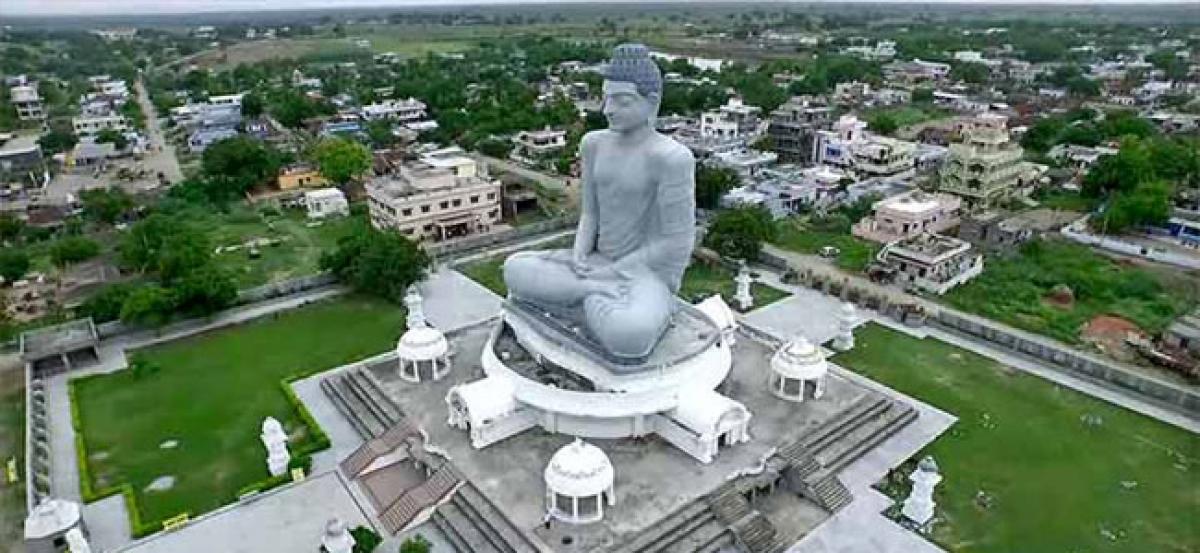Live
- GMR Airports Unveils AI-Powered Digital Twin Platform to Transform Airport Operations
- India poised to become leading maritime player: PM Modi
- Top Causes of Kidney Stones and How to Recognize Silent Symptoms
- India’s renewable energy capacity logs 14.2 pc growth at 213.7 GW
- Winter Session of Odisha Assembly adjourned sine die
- Biden calls Trump's tariff approach 'major mistake'
- After Drama Over Eknath Shinde’s Chief Minister Race, Maharashtra Cabinet Formation Faces New Tensions
- Egyptian FM, Blinken discuss recent developments in Syria
- Iran's supreme leader says Syria's developments result of US-Israeli 'plot'
- Elon Musk to Purchase $100 Million Luxury Mansion Next to Donald Trump's Mar-a-Lago, Report Reveals
Just In
Poor feel the pinch of steep increase in housing cost in capital city


The rise in cost of houses to houseless poor in capital city, Amaravati, may force them into indebtedness as Municipal Administration and Urban Development determined to implement high rates (SSR rates 2016-17) to those houses. While a civic body such as Vijayawada Municipal Corporation is constructing houses applying a rate of Rs 1,388 per sq. ft, the MAUD has fixed around Rs 1,913 per sq. ft in
Vijayawada: The rise in cost of houses to houseless poor in capital city, Amaravati, may force them into indebtedness as Municipal Administration and Urban Development determined to implement high rates (SSR rates 2016-17) to those houses. While a civic body such as Vijayawada Municipal Corporation is constructing houses applying a rate of Rs 1,388 per sq. ft, the MAUD has fixed around Rs 1,913 per sq. ft in Amaravati.
Highlights:
- MAUD fixed Rs 1,913 per sq ft while VMC is applying Rs 1,388 per sq ft
- Private builders say the cost may not exceed Rs 1,400-Rs 1,500 per sq ft
- Each beneficiary may suffer additional cost of Rs 1.5 lakh-Rs 2 lakh
As a result, a beneficiary, who will get a flat of 300 sq. ft may suffer additional cost of around Rs 1.50 lakh to Rs 2 lakh. The burden would be in crores of rupees when compared to total houses. The Andhra Pradesh Capital Region Development Authority (APCRDA) has decided to build 5,024 houses in ten different locations of capital city area for houseless poor who resides in temporary houses in encroached lands and as tenants.
It has also been decided to construct 992 houses with 300 SFT, 1536 houses with 365 SFT and 2,496 houses with 430 SFT under G+3 Pattern with Shear wall (Monolithic Technology). In this technology, pre fabricated walls are used (without using bricks) and the unit cost should be reduced in general. But, the MAUD fixed Rs 1,913 per sq. ft for the houses of 300 sq. ft totaling the cost of Rs 5.74 lakh. The beneficiary will have to repay Rs 2.88 lakh to banks as loan amount.
The rate was fixed as Rs 1,809 per sq ft for houses of 365 sq. ft totaling the cost of Rs 6.60 lakh. The beneficiary will have to pay Rs 3.47 lakh and would have to spend another Rs 50,000 as his own component. Similarly, the rate was fixed as Rs 1,739 per sq ft for the houses of 430 sq ft totaling cost of Rs 7.48 lakh. The beneficiary has to repay Rs 3.96 lakh to bank and have to bear another Rs 1 lakh on his own.
Interestingly, the APTIDCO (Andhra Pradesh Infrastructure Township Corporation), which has been entrusted the construction of houses, has reportedly submitted a proposal quoting around Rs 1,450 per sq ft, which was ignored. At the same time, the VMC has also been constructing houses for poor at the rate of Rs 1,358 per sq ft and the total unit cost is Rs 3.52 lakh (for 250.2 sq ft.
A senior builder representing CREDAI (Confederation of Real Estate Developers Association of India) said that the unit cost may not exceed Rs 1,400- Rs 1,500 even for monolithic technology. “Repayment of such huge amounts would be a burden to the homeless poor and the objective may also be affected” he said.
However, the CRDA said in G.O 213 that the foundation cost in the capital city is high as it requires pile foundation. The pile foundation is used when there is weak soil on the surface (Black cotton soil). The layer cannot support the weight of the building. So, the APCRDA has indirectly agreed that the soil in capital city area was not suitable to heavy structures.
By K Varaprasada Rao

© 2024 Hyderabad Media House Limited/The Hans India. All rights reserved. Powered by hocalwire.com






